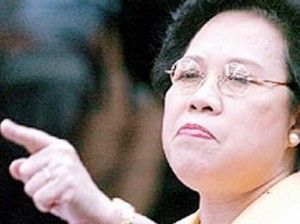Aid to poor should be coursed through health centers, not legislators—Santiago
MANILA, Philippines – Senator Miriam Defensor Santiago has filed a bill she believed would help solve senators and congressmen’s problem about letting go of their pork barrel as a means to help their poor constituents’ need for immediate medical assistance.
Santiago has filed Senate Bill No. 1445 providing for the distribution of essential medicines to the country’s indigents via the barangay (village) health centers.
Santiago said in a press release that the practice of senators and congressmen of giving medical assistance to indigents through their priority development assistance fund “just facilitates corruption and creates a culture of mendicancy among our people.”
“This is the solution to the so-called problem of senators and congressmen, who say they are worried they can’t help their constituents anymore if we take away their pork barrel,” Santiago said. “Let’s just distribute free essential medicines directly to the people through barangay health centers.”
The bill seeks to provide the secretary of health the discretion to determine the kind of medicines that may be included in the program.
The bill also seeks to provide for the distribution in health centers of free medicines for cough, colds, nasal congestion, sore throat, burns, aches and pains, diarrhea, and intestinal worm infestation in children.
Santiago was among the first to call for the abolition of the P25-billion PDAF after it was found that billions of pesos earmarked for livelihood projects had been diverted to fake non-governmental organizations, part of which allegedly found its way back to the legislators as kickbacks.
Santiago has filed a resolution for the PDAF’s three-year phase out but majority of senators have said they were in favor of eliminating the PDAF from the 2014 budget.
The Senate, however, has yet to decide whether to take out the P25 billion from the proposed P1.226-trillion national budget or to re-align the allocation to other programs particularly to those on health and education.
“While the Constitution mandates health care for every Filipino, a significant number of the population is unable to afford basic health care services. For the poorer population, it is least in their priorities,” Santiago said. “They prefer not to go to hospitals or clinics for treatment because of the high costs of medical service and medicines.”
Quoting the Department of Health, Santiago said medicine prices in the Philippines were substantially higher than in other countries.
“Aside from the high prices, the poorer rural communities also lack pharmacies. There are village drugstores, Botika ng Bayan or Botika ng Barangay, which sell medicines at lower prices, but some of the poorest and far-flung provinces do not have them,” Santiago said.
“Barangay health centers also provide free medicines and supplements, but supplies tend to be sporadic. This bill seeks to ensure that free essential medicines are accessible to the poor,” Santiago added.
RELATED STORIES:
